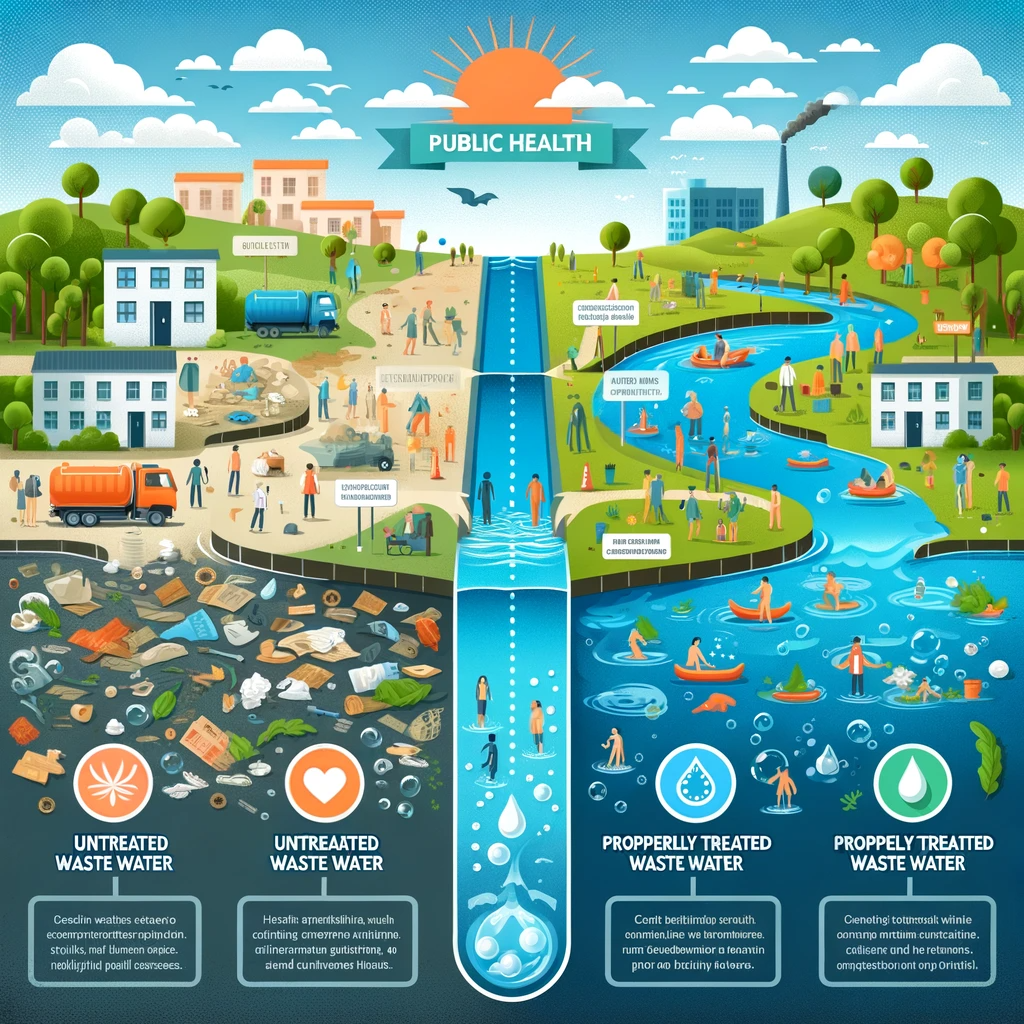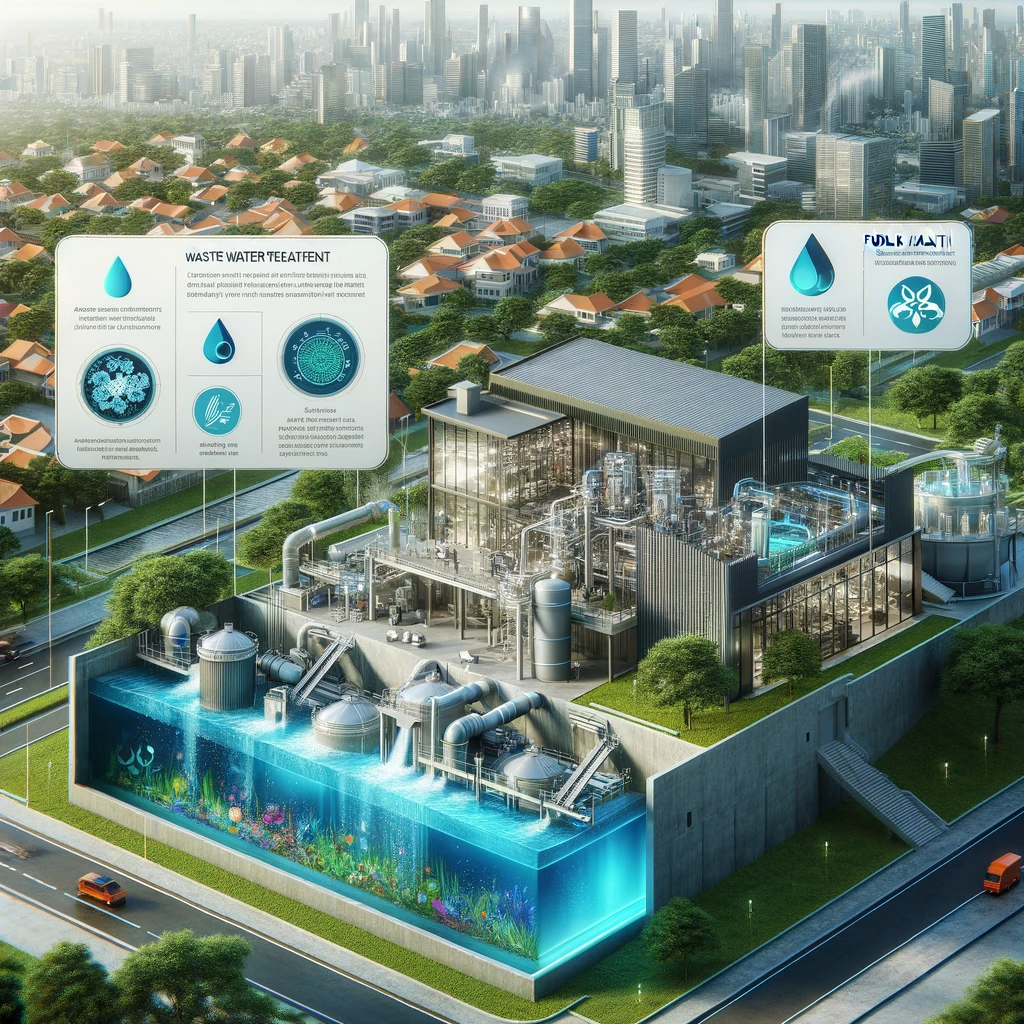Waste Water Supply and Public Health
The significance of waste water management for public health cannot be understated. Proper waste water supply and sanitation systems are crucial in preventing the spread of diseases caused by viruses, bacteria, and parasites. In times of emergency, such as during floods, hurricanes, or earthquakes, damage to waste water systems can lead to the contamination of drinking water supplies and an increased risk of disease. Effective waste water management is not only important for emergency preparedness and response, but also for maintaining the overall health of communities. The information on waste water management and its impact on public health is a vital resource for understanding the various topics related to waste water systems, treatment facilities, and the protection of water quality.

Importance of Clean Water and Hygiene
Clean water and hygiene play a crucial role in maintaining the quality of Waste Water Supply and Public Health. With the facility of wastewater surveillance data, it is now possible to detect the presence of viruses, such as SARS-CoV, in the wastewater system. By analyzing wastewater data, trends in virus levels can be identified, allowing for targeted actions to be taken to prevent the spread of infections in specific populations or areas. The concentration of the virus in wastewater can provide valuable information on case trends and help in the communication of public health measures. Therefore, wastewater surveillance data is an essential tool in the fight against diseases and the protection of community health.
In order to assess the risk and monitor the transmission of diseases, wastewater sampling at various points in the sewer system and wastewater treatment plants is necessary. This data allows for the evaluation of disease trends and the identification of areas with higher infection levels. By monitoring the wastewater concentration data, public health departments can categorize the severity and duration of outbreaks and allocate resources accordingly. The monitoring of wastewater indicators provides valuable insights into the effectiveness of community mitigation measures and helps in the identification of areas that require additional testing resources. Overall, the analysis of wastewater data is vital in understanding the environmental factors that impact public health and in implementing effective disease control and prevention strategies.
Health Implications of Poor Waste Water Disposal
Poor waste water disposal can have severe health implications for the public. When waste water is not properly treated or managed, it can become a source of contamination for human consumption. In reality, many water treatment systems do not have sensors in place to detect the presence of harmful substances in the effluent water released from treatment plants. As a result, the quality of the water that drains into households and the environment is compromised, leading to a host of wastewater-related problems. This includes the presence of harmful bacteria, parasites, algae, and petroleum residue, which can pose a threat to human life and the ecosystem. In fact, millions of deaths and illnesses are reported each year across the globe due to the consumption of untreated water contaminated with viruses, infections such as hepatitis and polio, and protozoa, tapeworms, and their offspring. The effluent releases from inadequate wastewater treatment facilities also pose a danger to roadways, as they can cause outbreaks of diseases such as dysentery, cholera, and typhoid. The use of proper water treatment equipment and water management solutions, such as SCADA (Supervisory Control and Data Acquisition) systems, can greatly improve the efficiency and safety of wastewater systems and help mitigate these health effects.
Impact of Inadequate Waste Water Treatment on Public Health
Inadequate waste water treatment has a significant impact on public health. The numbers speak for themselves – the improper management of waste water supply can result in various health issues. The government plays a crucial role in ensuring the security and safety of waste water systems, especially in the context of cyberattacks and other security threats. The agendas and impacts of these attacks can be far-reaching and devastating, affecting not only the public health sector but also other vital areas such as firefighting, hospitals, energy, food, and agriculture. The release of chemicals and contaminants from untreated waste water can lead to illnesses and casualties, posing a threat to the vitality of communities. Disasters, whether natural or man-made, can also have a profound effect on waste water management, causing a disruption in the sector’s resources and management. The combination of dysfunction, safety issues, and corruption can further exacerbate the negative effects and create a domino effect on public health. Therefore, it is essential to address the impact of inadequate waste water treatment on public health through improved management, increased funding, and better cybersecurity measures to ensure the safety and resilience of water infrastructure.
The Connection Between Untreated Waste Water and Disease
The connection between untreated wastewater and disease poses a significant threat to public health. Wastewater surveillance plays a crucial role in detecting and monitoring the spread of diseases within communities. During the pandemic, several states established wastewater disease surveillance systems (NWSS) to track the presence of pathogens in wastewater samples. This surveillance data is a valuable tool for public health officials to take swift action and implement appropriate measures to prevent disease outbreaks. By monitoring wastewater at treatment plants and community wastewater systems, the NWSS provides crucial information on disease incidence and helps protect the health of the population.
Wastewater surveillance efforts have shown great promise in identifying infectious disease outbreaks and monitoring community health. The presence of pathogens in wastewater samples can serve as an early warning sign for potential disease outbreaks. By testing and analyzing samples, scientists can detect the presence of specific pathogens and assess the level of risk to public health. This data can provide insights into the prevalence and spread of diseases within a community population. Wastewater surveillance systems have been implemented in various cities across the country, providing valuable information for public health officials and guiding their response and prevention strategies. The data collected through wastewater surveillance can inform decisions related to public health interventions, resource allocation, and emergency response, making it a powerful tool in safeguarding community health.
IllEffects of Contaminated Drinking Water
Contaminated drinking water poses significant risks to public health. The presence of harmful pathogens and contaminants in water sources can lead to the spread of diseases and infections, endangering the well-being of communities. To address this issue, various deliberations and partnerships have been established between wastewater utilities, testing laboratories, and public health agencies. These collaborations aim to enhance wastewater surveillance programs, increase laboratory capacity, and improve disease control and prevention efforts. By integrating participants from different sectors and sharing information on disease outbreaks and pathogen dynamics, the magnitude and severity of waterborne diseases can be better understood. This information can then be used to inform policy decisions, allocate resources, and implement community health interventions to safeguard public health.
Advances in Waste Water Treatment and Health Outcome
Advances in waste water treatment have had a significant impact on public health outcomes. With a wide range of settings and speakers as the basis for the literature review, it is evident that improved waste water management can have positive effects in various contexts. Police and evaluation of waste water treatment strategies have been conducted at the county level, with the enactment of the Rescue Plan Act providing a necessary boost in resources. Analysis of waste water transmission and privacy considerations have also been addressed in the research. The monitoring of waste water samples has played a vital role in disease management, with coordination between laboratories in the field and utilities being crucial. Lessons learned from the monitoring process have helped in the formulation of effective strategies for risk management. The use of wastewater in agriculture has also been a driver for improving waste water treatment, as it poses health risks if not properly managed. Efforts to target improvements in waste water treatment are particularly important in the face of climate change, water scarcity, and rapid urbanization. In summary, advancements in waste water treatment have provided tools and approaches to ensure the safety of water supplies and protect public health.
Modern Waste Water Treatment Techniques
Waste water treatment techniques have a crucial role in ensuring the safety and quality of water supply, ultimately contributing to public health. Guideline implementation and policy makers’ decisions play a significant role in the development and utilization of these techniques. In a discussion paper by the Food and Agriculture Organization (FAO) of the United Nations, options for wastewater management are explored, highlighting the importance of proper treatment in addressing health concerns. The paper calls for the combination of wastewater epidemiology, pathogens detection, and surveillance systems to effectively monitor and manage potential risks to human health. By utilizing wastewater data, including the detection of drug residues and pathogens, policy makers can make informed decisions to safeguard public health and minimize the risk of waterborne diseases.
Modern wastewater treatment facilities serve as a vital tool in protecting public health and the environment. These facilities play a key role in the removal of various contaminants and disease-causing agents from wastewater, thereby reducing the risks associated with exposure to harmful materials. Studies conducted by Kasprzyk-Hordern et al. and Karthikeyan et al. have demonstrated the effectiveness of wastewater treatment processes in the removal of drug compounds and human pathogens. The monitoring of wastewater samples has proven valuable in the detection and tracking of infectious diseases, such as poliomyelitis epidemics and outbreaks of viral infections like SARS-CoV-2. The analysis of wastewater monitoring data provides critical insights into population health, allowing for the implementation of targeted interventions and policies to protect public health.
Health Improvements through Better Waste Water Practices
Waste water supply plays a crucial role in ensuring public health. The presence of untreated waste water can pose a significant threat to the well-being of individuals and communities. According to the World Health Organization, 10.1021/acs.estlett.2c00496, poor waste water disposal is linked to a number of health implications such as the spread of diseases. Strategies and responses at various scales are needed to address these issues and improve the quality of waste water systems. Developments in waste water treatment techniques, such as flocculation, disinfection, filtration, coagulation, and sedimentation (Figure 1a), have led to better health outcomes and the reduction of waterborne pathogens, including viruses, helminths, fungi, and protozoa.
Strategies for Ensuring Safe Waste Water Supply
Strategies for ensuring safe wastewater supply are crucial for safeguarding public health. Assays and technologies have evolved to detect various contaminants in wastewater, with studies showing that 31% and 26% of wastewater samples from Rockland County and several counties in Spain, respectively, tested positive for indicator organisms. These testing rates indicate the potential health crisis that could arise if untreated wastewater enters water sources. Implementing wastewater surveillance programs, such as in Oklahoma’s Stillwater district, enables early detection of viral and bacterial pathogens, including drug-resistant strains. By employing advanced techniques like PCR and metagenome analysis, researchers can monitor the shedding dynamics of antimicrobial resistance genes and track infection patterns. Additionally, wastewater sequencing data processing models facilitate the integration of wastewater surveillance data with human clinical infections, allowing for a better understanding of transmission risks and health risks associated with wastewater contamination. Such tools and approaches provide a promising toolbox for risk assessment and the development of effective intervention strategies to mitigate the health impacts of wastewater systems on communities.
Role of Government Policies in Waste Water Management
Government policies play a crucial role in ensuring the management of wastewater systems and safeguarding public health. Waste Water Supply and Public Health are interconnected, and effective policies are vital in addressing the challenges associated with wastewater systems. These policies aim to regulate the collection, treatment, and disposal of wastewater to mitigate any adverse impacts on public health. By implementing comprehensive regulations and guidelines, governments can ensure the safe supply of water to communities, reducing the risks of contamination and waterborne diseases. Furthermore, government policies enable the monitoring and assessment of wastewater systems, allowing for early intervention and the implementation of necessary improvements to protect public health.
Government policies also facilitate the development and implementation of advanced technologies and strategies in wastewater management. These policies encourage research and innovation in wastewater treatment processes, leading to the adoption of modern techniques such as fusion PCR, mass spectrometry, and Raman spectroscopy. These technologies provide greater specificity and accuracy in detecting contaminants, drug consumption patterns, and pathogen diversity in wastewater effluents. Additionally, government policies promote collaboration between different sectors, such as academia, industry, and public health agencies, to develop effective monitoring systems and warning mechanisms that can detect and respond to potential health risks. This multi-faceted approach complements traditional monitoring methods and enhances the overall management of wastewater systems for the benefit of public health.
Community Participation in Safe Water Supply Practices
Community participation plays a vital role in ensuring safe water supply practices and protecting public health. Effective waste water supply management requires the active involvement of individuals, organizations, and government agencies. For instance, in the city of Clermont-Ferrand, France, community-driven initiatives have been successful in identifying and addressing waste water contamination sources, such as pharmaceutical residues like cocaine and morphine. Through collaborative efforts with manufacturers, research organizations, and healthcare officials, wastewater monitoring and testing results have been used to guide targeted actions in managing drug usage and preventing their harmful impact on public health.
In addition to individual actions, community engagement is also essential in implementing effective waste water treatment systems. For example, in Guangzhou, China, community-based organizations have worked tirelessly to educate residents on the importance of proper waste water disposal and the impact of untreated waste water on public health. Through awareness campaigns and educational programs, residents have been encouraged to adopt responsible waste management practices, which include proper sorting and disposal of sewage sludge and other waste products. This collective effort not only prevents the spread of diseases but also safeguards the environment and promotes a healthier future for all.
Challenges and Opportunities in Waste Water Management
Challenges and Opportunities in Waste Water Management
The management of waste water poses several challenges as well as opportunities for improving public health. One of the main challenges is the proper supply of clean water to the population. Inadequate waste water treatment systems can lead to contaminated water sources, putting the health of individuals at risk. Studies have shown that livestock excretions and sewage examination have revealed the presence of various pathogens and contaminants in wastewater systems. Furthermore, the rise of drug abuse and addiction has also contributed to the increasing levels of pharmaceuticals in wastewater. However, advancements in technology, such as wastewater sequencing analysis and the use of gold nanorods for tracking, present opportunities for better understanding the composition and activity of contaminants in wastewater. By addressing the challenges and utilizing the available opportunities, it is possible to improve waste water management and protect public health.
Obstacles in Implementing Waste Water Treatment Systems
Obstacles in implementing wastewater treatment systems can have significant implications for public health and the supply of clean water. Numerous studies, including those by Berendonk, Cacace, and Brackney, have highlighted the potential health risks associated with untreated wastewater. These risks include the presence of pathogens and contaminants that can jeopardize the health of individuals and communities. Additionally, research by Grubaugh, Kaplan, and others has underscored the importance of accurate measurement and assessment techniques to monitor the quality of wastewater and its impact on public health. These studies emphasize the need for an engineering framework that prioritizes the effective treatment and disposal of wastewater to protect public health and ensure a safe water supply.
Implementing wastewater treatment systems at a community level can be challenging due to various factors. Research by Nardone, Aurino, and Brozak highlights the role of government policies in supporting the development and implementation of effective waste management practices. However, community participation is equally important, as research by Phan, Alcalde, and others has shown that without community engagement and awareness, the success of wastewater treatment systems can be compromised. The involvement of local communities in safe water supply practices, such as proper waste disposal and monitoring, is crucial for maintaining the health and well-being of individuals and preventing the spread of diseases. Addressing these obstacles requires a collaborative approach among government agencies, researchers, and communities to develop and implement sustainable wastewater management strategies that prioritize public health and the protection of water sources.
Conclusion
In conclusion, the significance of wastewater management for public health cannot be overstated. The importance of clean water and hygiene in safeguarding public health is undeniable. Poor wastewater disposal can have severe health implications, including the contamination of drinking water sources. The connection between untreated wastewater and the spread of diseases is a major concern. Fortunately, advancements in wastewater treatment techniques have led to significant health improvements. Strategies such as government policies and community participation play a crucial role in ensuring safe wastewater supply. However, there are still challenges and opportunities in wastewater management that need to be addressed. Overall, prioritizing wastewater treatment and management is essential for protecting public health and maintaining water quality.
FAQ
Why is waste water management important for public health?
Waste water management is crucial for public health as it helps to prevent the spread of diseases and ensures clean water supply for communities.
What is the impact of poor waste water disposal on public health?
Poor waste water disposal can lead to contamination of drinking water sources, which can result in the spread of waterborne diseases and other health issues.
How does untreated waste water contribute to disease?
Untreated waste water contains harmful pathogens and pollutants that can contaminate water sources, leading to the transmission of diseases such as cholera, typhoid, and hepatitis.
What are the ill-effects of consuming contaminated drinking water?
Consuming contaminated drinking water can cause various illnesses such as diarrhea, stomach cramps, vomiting, and in severe cases, it can even lead to death.
What are some advances in waste water treatment techniques?
Advances in waste water treatment include the use of technologies such as activated sludge process, membrane filtration, and UV disinfection, which help to remove pollutants and pathogens effectively.
How can better waste water practices improve public health?
Implementing better waste water practices, such as proper treatment and disposal, can reduce the risk of waterborne diseases and improve overall public health outcomes.
What are some strategies for ensuring a safe waste water supply?
Strategies for ensuring a safe waste water supply include regular monitoring of water quality, proper maintenance of treatment facilities, and community education on hygiene practices.
How does government policy play a role in waste water management?
Government policies shape regulations and standards for waste water management, ensuring that proper treatment and disposal practices are followed to protect public health.
What is the role of community participation in safe water supply practices?
Community participation is essential in promoting safe water supply practices as it involves raising awareness, practicing proper hygiene, and supporting waste water management initiatives.
What are the challenges and opportunities in waste water management?
Challenges in waste water management include limited resources, inadequate infrastructure, and lack of public awareness. However, there are opportunities for innovation, investment, and collaboration to address these challenges effectively.
What are some obstacles in implementing waste water treatment systems?
Obstacles in implementing waste water treatment systems include high initial costs, technical expertise requirements, and resistance to change. However, these obstacles can be overcome with proper planning and support.
In conclusion, why is waste water management crucial for public health?
Waste water management is crucial for public health as it ensures clean water supply, prevents the transmission of diseases, and promotes overall well-being within communities.




